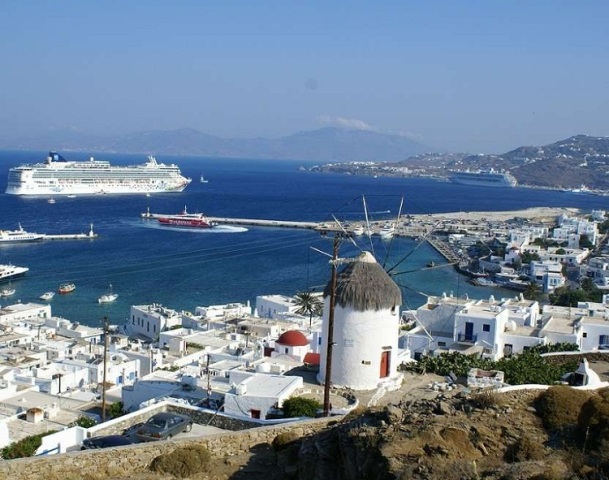Greece, with its historical sites, pristine beaches and quaint islands, lures tourists from far and wide. Check out some fun and interesting facts about Greece.
Facts About Greece
Greece, the name only brings the thought of historical sites and people in robes in mind. Greece is the world’s third largest producer of olives and it is believed that the olive tree was the gift of ‘Athena’, the Goddess of Wisdom. The Greek language originated about 3000 years ago and is considered today as one of the oldest languages in the world. One of the most popular tourist destinations in Europe, the country is visited by a large number of tourists every year. It is the place where pristine beaches mesmerize you with azure waters and serene surroundings, the place where archaeological and historical sites transform you to a different time altogether. Nature has endowed Greece with bewitching beauty, mainly in the form of picturesque islands. These islands lure tourists to forget the grinding tensions of daily life and rejuvenate their body as well as soul. Want to know more about the country? Check out some interesting and fun facts given about it.

Image: L. Richard Martin, Jr.@flickr
Fast Facts
Continent: Europe
Area: 131,990 km2
Capital: Athens
Population: 10,787,690 (2011 census)
Currency: Euro
Official Languages: Greek
Calling Code: 30
Type Of Government: Unitary parliamentary republic
Interesting & Fun Facts about Greece
- The official name of Greece is the Hellenic Republic.
- Athens is the capital of Greece. It is also the most populated city in the country.
- Ancient Greek civilization comprised of Southern Italy, the coastal areas of Turkey and the Black Sea, along with some colonies in North Africa, Southern France and Spain. Modern Greece is just a part of it.
- 80 percent landscape of Greece comprises of mountains. Only one half of the country is covered by forests, the other half is barren.
- There are about 3000 islands in Greece. However, only a few hundred of them are inhabited.
- Greece boasts of having 7,000 (limestone) caves, which form 24,000 km of underground galleries.
- Mount Olympus is the highest mountain in Greece, with a height of 2,919m. It is believed to have served as the home of the Gods in the ancient Greek religion.
- As per 2007 UNICEF report, Greece had the lowest percentage of teenagers smoking cigarettes (or cannabis) or living in a step family structure.
- WHO 2002 stats state that Greek men and women have the highest incidence of obesity in Europe.
- The renowned Belgian pralines Leonidas have been named after the 5th century BC King of Sparta, who was homonymous.
- Greece spreads over an area of somewhere around 51,000 square miles, with the length of its coastline being 9,300 miles.
- There are as many as 63 different folk dances in Greece.
- The popular yo-yo toy, the second oldest known toy in the world, originated in the days of ancient Greece, around 3,000 years ago.
- Traditionally, Greeks have been known to celebrate their name days, rather than their birth dates.
- The natural resources of Greece include gold, marble, magnetite, petroleum, lignite and bauxite.
- About 98% of the Greek population is Greek Orthodox, whereas only 1.3% of the population is Muslim.
- The main industries of this country are wine, tobacco, dairy products, olives, metal, barley, wheat, potatoes and meat.
- Hydropower forms as the major source of electricity in Greece.
- 94% of the population is Greek and 4% is Albanian. Armenians, Bulgarians, Macedonians and gypsies form 2 % of the Greek population.
- This country has the highest number of museums in the world.
- Football is the national sport of Greece.
- Greece is the home to several rare types of wildlife creatures. About 116 species of mammals, 59 types of reptiles, 18 types of amphibians, 240 species of birds and approximately 107 varieties of fish.
- The first Olympics Games were conducted in 776 B.C in Greece.
See also
More from iloveindia.com
- Home Remedies | Ayurveda | Vastu | Yoga | Feng Shui | Tattoos | Fitness | Garden | Nutrition | Parenting | Bikes | Cars | Baby Care | Indian Weddings | Festivals | Party ideas | Horoscope 2015 | Pets | Finance | Figures of Speech | Hotels in India : Delhi | Hyderabad | Chennai | Mumbai | Kolkata | Bangalore | Ahmedabad | Jaipur
- Contact Us Careers Disclaimer Privacy Policy Advertise With Us Lifestyle Sitemap Copyright iloveindia.com. All Rights Reserved.







